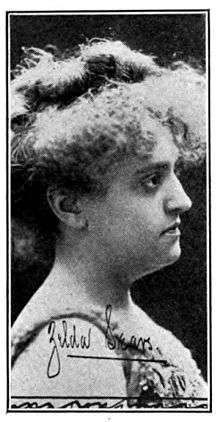Zelda Sears

Zelda Sears (née Paldi; January 21, 1873 — February 19, 1935) was an American actress, screenwriter, novelist and businesswoman.
Youth
Sears was born near Brockway Township, St. Clair County, Michigan. Her father, Justin Lewis Paldi, ran a farm more than twenty miles from the closest railroad station. By age 12, she worked for L.A. Sherman, a wealthy man in Brockway. He owned a general store where she became a salesgirl. Her father moved his family to Port Huron.
She found employment for a time as check girl before advancing to cashier and general clerk. The job was obtained by capturing a $10 prize on the stock contained in the store. Winning gave her the privilege of working for $3 a week. Sears was eventually hired to contribute pieces to the town's newspaper by the managing editor. Dissatisfied that Port Huron was too small, she left after five years, aged seventeen. She journeyed first to Detroit and then ventured to Chicago.
Painter
She roomed at the Chicago YWCA for three and a half dollars weekly. Sears answered an ad for women to paint flowers on vases and boxes. Her grandfather, Andrew Paldi, was an Italian painter who painted mural decorations in Detroit. She secured employment in a crowded loft where twenty girls painted on celluloid. She expended great effort and earned double the cost of her board.
Newspaper writer
She continued painting flowers on vases but started to contribute her writings to a humor column of a Chicago newspaper. She submitted a story about her first bicycle ride. She made $8 a week as a full-time reporter. Sears became fascinated with Sarah Bernhardt who was performing in Chicago. She observed the famous actress and was able to obtain an interview on one occasion. This came about when she saved Bernhardt from tripping over a loose carpet on stage. Sears' father died around this time. He left his children a small sum in life insurance and a library amply furnished with volumes. Among the books were paperbacks of plays, which she read.
Actress

She moved on, working successively as an extra girl and in an opera chorus. Sears joined a class in a dramatic school. She journeyed to New York City with a letter of introduction to a New York theatrical manager. Her initial opportunity in New York City was obtained through A.L. Erlanger. She joined a ballet and earned $20 a week while also learning toe dancing. Her first part was a very small one in a stock production of Sowing The Wind. She played comic roles on stage, learned shorthand, and even opened her own typewriting business. The impetus of her writing career occurred when her landlady went on vacation to the mountains and Sears managed her boarding house while she was away. She began to copy scientific articles for the noted surgeon, Dr. William Bull. Sears observed life in his sanitarium and turned what she saw into a fictional story, which she sold to a magazine. Readers became privy to the inner workings of the institution by reading Zelda's The Name Above The Door. Her income grew after several more short stories were accepted for publication.
Dissatisfaction led Sears to return to Chicago, where she joined the acting troupe of John Stapleton. Her first meaningful part came by way of Harry Parker, who was general manager for William A. Brady. Sears' stage career was further boosted by her acting in a production of Lovers Lane. Other plays in which she appeared were Women and Wine, Girls, The Blue Mouse, Love Among The Lions, The Girl He Couldn't Leave Behind Him, Keeping Up Appearances, The Nest Egg, Standing Pat, The Truth, The Show Shop, The Scarlet Woman, and Undertow.
In 1907 Sears was appearing in Baltimore in a play called The Truth by Clyde Fitch. The star of the play was Clara Bloodgood who was best friends with Sears. Bloodgood despondent about something concerning the play and Fitch committed suicide in her hotel room.
Writer
Playwrights began to trust her to add dialogue to her roles in stage productions. Sears learned to write stage speeches and construct scenes. Over a period of eleven years she read more than one hundred plays. She embellished ten of these for production. As a writer she benefited greatly from her association with Clyde Fitch. Earlier he had cast her in Lovers Lane. Sears wrote dialogue for theatrical shows like Lady Billy, Cornered, The Clinging Vine, and The Magic Ring. She came to Hollywood to be a scenarist for Cecil B. DeMille and MGM in the early 1930s. Sears co-wrote The Divorcee, a 1930 American Pre-Code drama film along with Nick Grindé, and John Meehan. She also appeared in it as "Hannah". She had a part in her final film scenario, A Wicked Woman (1934).
Death
Sears died at her Hollywood home in 1935, aged 62 from undisclosed causes. She was survived by her second husband, Louis Wiswell, and a sister, Marie Paldi. She had taken her professional name from her first husband, Herbert E. Sears.
References
- Lincoln Star, From Milkmaid To Highest Paid Playwright, Sunday, August 13, 1922, Magazine Section, pg. 29
- New York Times, Zelda Sears Dies; Writer, Actress. February 20, 1935, pg. 19
External links
| Wikimedia Commons has media related to Zelda Sears. |
- Zelda Sears at the Internet Movie Database
- Zelda Sears at the Internet Broadway Database

- Portrait of Zelda Sears, NY Public Library Billy Rose Collection
- 1913 portrait (University of Washington, Sayre Collection)